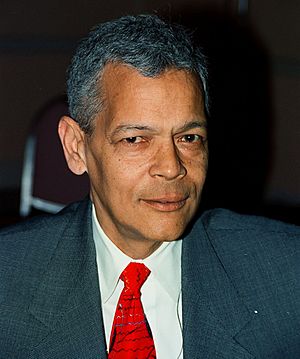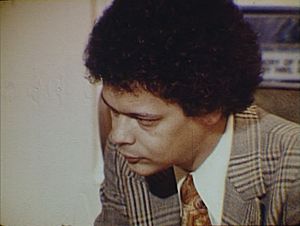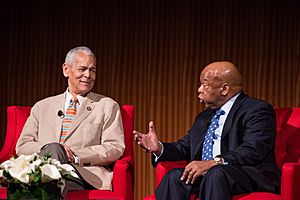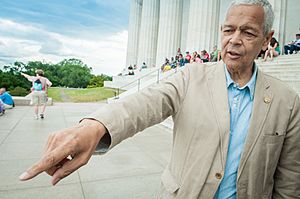Julian Bond facts for kids
Quick facts for kids
Julian Bond
|
|
|---|---|
 |
|
| Chairman of the National Association for the Advancement of Colored People | |
| In office 1998–2010 |
|
| Preceded by | Myrlie Evers-Williams |
| Succeeded by | Roslyn Brock |
| Member of the Georgia State Senate from the 39th district |
|
| In office January 13, 1975 – January 12, 1987 |
|
| Preceded by | Horace Ward |
| Succeeded by | Hildred Shumake |
| Member of the Georgia House of Representatives | |
| In office January 9, 1967 – January 13, 1975 |
|
| Succeeded by | Mildred Glover |
| Constituency | 136th district (1967–1969) 111th district (1969–1973) 32nd district (1973–1975) |
| Personal details | |
| Born |
Horace Julian Bond
January 14, 1940 Nashville, Tennessee, U.S. |
| Died | August 15, 2015 (aged 75) Fort Walton Beach, Florida, U.S. |
| Political party | Democratic |
| Spouses |
Alice Clopton
(m. 1961; div. 1989)Pamela Horowitz
(m. 1990) |
| Children | 5 |
| Education | Morehouse College (BA) |
Julian Bond (January 14, 1940 – August 15, 2015) was an important American leader in the Civil Rights Movement, a politician, a professor, and a writer. He worked tirelessly for equal rights and justice for all people throughout his life. He helped start important civil rights groups, served in the Georgia state government for many years, and later led the NAACP, a major civil rights organization.
Contents
Early Life and Education
Julian Bond was born in Nashville, Tennessee, in 1940. His parents, Julia and Horace Mann Bond, were both educators. His father was a college president, and his mother was a librarian. Growing up, their home was a place where many important thinkers, activists, and artists would visit, like W. E. B. Du Bois and Paul Robeson. This environment likely helped shape young Julian's understanding of the world and the importance of education and social change.
When Julian was a child, his family moved to Pennsylvania when his father became the first African-American president of Lincoln University. Julian attended George School, a private boarding school, and later went to Morehouse College in Atlanta, Georgia. Morehouse is a historically black college, meaning it was founded to educate African American students during a time when they were often excluded from other colleges.
At Morehouse, Julian was an active student. He was on the swim team and helped start a literary magazine. College was also where he became deeply involved in the growing Civil Rights Movement.
A Champion for Civil Rights
The early 1960s were a time of major change and protest in the United States, especially in the South, as people worked to end segregation and gain equal rights for African Americans. Julian Bond was right in the middle of this important work.
While still a student at Morehouse in 1960, Julian Bond helped create the Student Nonviolent Coordinating Committee (SNCC). This group was made up of young people who believed in using peaceful methods, like sit-ins and protests, to challenge unfair laws and practices. SNCC played a vital role in the Civil Rights Movement, organizing protests and voter registration drives across the South.
Julian Bond became the communications director for SNCC. This meant he was in charge of sharing information about the group's activities and the civil rights struggle with the public. He traveled often, including to Mississippi during the "Freedom Summer" of 1964, when many people went to the state to help African Americans register to vote. This was dangerous work, but it was essential for making sure everyone had the right to participate in democracy.
In 1971, Julian Bond helped start the Southern Poverty Law Center (SPLC) in Montgomery, Alabama. The SPLC is a public interest law firm that fights against hate groups and discrimination through education and legal action. Julian Bond served as the SPLC's first president for almost ten years.
Later in his life, from 1998 to 2010, Julian Bond served as the chairman of the National Association for the Advancement of Colored People (NAACP). The NAACP is one of the oldest and most respected civil rights organizations in the United States. As chairman, Bond continued to advocate for civil rights, equality, and justice for all Americans. He led the organization during its 100th anniversary in 2009.
Julian Bond was a strong supporter of civil rights for all people. He believed that everyone, regardless of their background, should be treated with fairness and respect and have the same opportunities.
A Career in Politics
Julian Bond didn't just work for change from outside the government; he also decided to become a part of it.
In 1965, after the passage of important laws like the Civil Rights Act of 1964 and the Voting Rights Act of 1965, more African Americans were able to vote and run for office in the South. Julian Bond was one of the first African Americans elected to the Georgia House of Representatives.
However, his political journey started with a challenge. When he was first elected, some members of the Georgia House refused to let him take his seat because he had expressed views opposing the Vietnam War, which SNCC also opposed. Julian Bond believed this violated his right to free speech. He took his case all the way to the Supreme Court of the United States. In 1966, the Supreme Court ruled unanimously in his favor, stating that the Georgia House had indeed denied him his freedom of speech and that he must be seated. This was a major victory for free speech and for Julian Bond.
After this ruling, Julian Bond served four terms in the Georgia House of Representatives, from 1967 to 1975. He helped form the Georgia Legislative Black Caucus, a group of African American lawmakers working together.
In 1974, he was elected to the Georgia State Senate, where he served for six terms, from 1975 to 1987. In total, Julian Bond served twenty years in the Georgia state legislature, working on laws and policies that affected the lives of people in his state.
Julian Bond also gained national attention. In 1968, at the Democratic National Convention, his name was put forward as a possible candidate for Vice President of the United States. Although he quickly declined because he was too young according to the Constitution (you have to be at least 35 to be Vice President), it showed how respected he was on the national stage at a young age.
In 1986, Julian Bond ran for the U.S. House of Representatives but lost in a close primary election to another respected civil rights leader, John Lewis. After this, Julian Bond resigned from the Georgia Senate the following year.
Teaching and Writing
After his career in the Georgia legislature, Julian Bond shared his knowledge and experiences by becoming a professor. He taught history, focusing on the Civil Rights Movement, at several universities, including the University of Virginia from 1990 to 2012. He was known for bringing the history of the movement to life for his students, sharing personal stories and using historical materials like newsreels and music.
Julian Bond was also a writer. He wrote books and articles about civil rights and politics. He also had a nationally syndicated newspaper column called "Viewpoint."
Media Appearances
Julian Bond was a familiar face and voice in the media. He hosted a television show called "America's Black Forum" for many years. He also provided commentary for radio and appeared on TV shows like NBC's "The Today Show."
He was the narrator for the powerful and critically acclaimed PBS documentary series "Eyes on the Prize," which told the history of the Civil Rights Movement. His voice helped millions of people understand this important period in American history.
In 1977, he hosted the popular comedy show "Saturday Night Live," becoming the first black political figure to do so. He also had small acting roles in movies and miniseries, often playing himself or characters related to politics and civil rights.
Personal life and death
On July 28, 1961, Bond married Alice Clopton, a student at Spelman College. They had five children: Phyllis Jane Bond-McMillan, Horace Mann Bond II, Michael Julian Bond (an Atlanta City councilman), Jeffrey Alvin Bond, and Julia Louise Bond. They divorced on November 10, 1989.
In 1990 Bond married Pamela Sue Horowitz, a former SPLC staff attorney. Bond died from complications of vascular disease on August 15, 2015, in Fort Walton Beach, Florida, at the age of 75. He is survived by his wife, his five children, and eight grandchildren, and his brother James and sister Jane Bond Moore.
Awards and honors
- 2002, he received the National Freedom Award, from the National Civil Rights Museum.
- 2006, he was awarded the National Leadership Award, from the National LGBTQ Task Force
- 2009, he was awarded the Spingarn Medal, from the NAACP.
Among 25 honorary degrees, he was awarded:
- 1999, an honorary LL.D. from Bates College.
- 2008, an honorary degree from George Washington University. Bond was also the 2008 Commencement Keynote Speaker.
- 2009, an honorary L.H.D. from Macalester College.
- 2015, an honorary L.H.D. from Skidmore College.
See also
 In Spanish: Julian Bond para niños
In Spanish: Julian Bond para niños
 | Kyle Baker |
 | Joseph Yoakum |
 | Laura Wheeler Waring |
 | Henry Ossawa Tanner |




